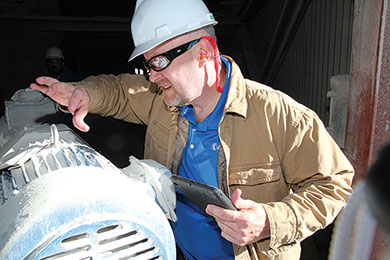Why Your Lubrication Program Needs a Champion

In my years of traveling the globe and assessing lubrication and reliability programs, I have noticed that every successful program has a clearly defined project champion. This person is the individual within a program who takes on the burden of ensuring that everyone involved is on board and behind the ultimate success of the project.
Champions greatly reduce the likelihood of a project’s failure. They are on the front lines and in direct communication with the entire team at all times. In essence, they are the guardians of the project. Their passion should be infectious because the tasks often cannot be completed alone. Champions must inspire, rally, encourage and motivate the team to successfully complete the project.
Champion Responsibilities
Identify Strategic Objectives
Champions must fully understand all the intricacies of the project so they can easily convey the “why” to others. They should also be able to answer the “what’s in it for me?” question for every team member involved.
Convey the Vision
Champions work with the team to ensure the project’s vision is successfully conveyed. They need to be able to lead the group to a common goal. Conveying what success looks like and making sure the team members all share the same vision will help increase the project’s efficiency.
Implement Best Practices
Change in an organization is difficult. The champion needs to know exactly what the best practices entail and should always be pushing toward those practices. If incorrect practices are implemented, it becomes nearly impossible to initiate change again in a short timeframe.
Identify and Eliminate Obstacles
Champions must identify and eliminate obstacles that may threaten the project’s viability within the organization. Knowing the expected roadblocks and being proactive in generating solutions for them when they arise can be extremely valuable and will increase the likelihood of the program’s success.
Prioritize Project Phases
These programs consume time, money and energy. Understanding where the biggest bang for your buck is and being able to prioritize are important qualities of a champion.
Relay Updates
Communication plays a vital role in a program’s success. Keeping the stakeholders well-informed will allow the program implementation to progress much more smoothly.
Allocate Resources
There is nothing more detrimental to a project than having the will and want with no resources. These resources are typically related to time, money or energy. If they are not carefully planned, scoped and allocated, the program will find an early demise.
Traits of a Successful Champion
Having met a number of champions over the years, I have found that they are incredible people who possess a variety of common traits, including the following:
Understanding of Tribology and Reliability
This subject matter takes years to master, and the sheer volume of material requires a champion to be passionate enough to want to continually learn.

Excellent Communication
Being able to bridge the gap in communication between upper management and plant-floor operations is a tough skill to learn. A champion should understand each group’s needs and wants as well as have the ability to speak to both in terms of what’s important to them.
Organized
Just as a train conductor must keep all the trains running on time, a champion must be able to juggle multiple projects within the program, making sure that efficiency is kept high and waste is minimized.
Motivational
Gaining buy-in is a major contributor to program success. Knowing how to most effectively motivate team members on both sides of the operation (management and skilled labor) is a critical role of a champion.
Negotiation
As with most things in life, there is always a trade-off. Being able to understand the trade-off and negotiate the best possible outcome for the company can be a valuable trait for a champion.
Problem-solving
There will be many obstacles on the path to program success. Possessing the ability and resourcefulness to navigate these obstacles is rare because the obstacles are often broad in scope. They may range from engineering problems to the culture or personnel.
I have witnessed great initiatives with all the proper resources fail because there was no champion. Someone may have been placed in charge, but it wasn’t a true champion. These individuals were hired to do a job that had certain tasks. Even though they might have been successful in performing those tasks, the program was ultimately a failure.
On the other hand, I’ve seen underfunded and understaffed initiatives thrive because there was a proper champion. What’s so special about these people that could literally sway companies from one extreme to the other? What they possess has the aura of a “secret sauce.” Although I don’t know all the ingredients to this secret sauce, I do know that a large part of it is passion. You can tell just by having a simple conversation with these people. You can see it when they describe their role at the company. You can witness it in the way they carry themselves during their day-to-day activities. It becomes infectious. That’s how you know you have a true champion for your program.
As much as I hate to admit it, consultants can’t be your champion. They can be essential contributors, they can show passion, and they can perform all the activities that can help you be successful, but they can’t be your champion.
Relying on consultants offers many advantages, including benefiting from their knowledge and experience in implementing a program. More often than not, the program will get up and running almost flawlessly. The problem comes down the road. If no one at the plant buys in or feels that they are part owner of the project, the likelihood of sustaining success will diminish over time.
The solution in these cases has been a champion for hire. These individuals are trained professionals who possess a wealth of knowledge and passion and hold many of the keys to unlocking the path to a successful program. They are transplanted into the program in its infancy stage but are not consultants. They live at the site and become a part of the culture and workforce. I have found that they can increase the probability of success to the point where it can almost be guaranteed.
